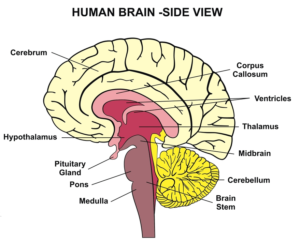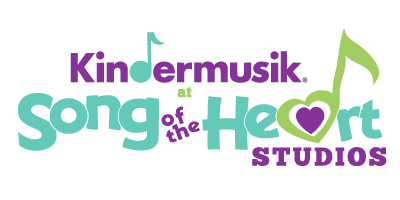Neuromusicology. Ever heard of it?
It is the scientific study of the effects of music on the brain.
We musicians and music educators have long had anecdotal evidence of the benefits of musical study on cognitive functioning, but we are getting more and more empirical data all the time, thanks to advancing technology in neuroscience.
At Kindermusik we often teach that music stimulates every area of the brain and thus every area of development. But what does that mean? The implications are so vast that they can’t possibly be contained in summary in a single blog post. Our blog will begin a new series, sampling the specific findings of the field of neuromusicology, to help you understand what bringing your child to Kindermusik at Song of the Heart studios is actually doing to their brains and bodies on a cellular level.
The brains of musicians have been proven to be larger and more connective than that of non-musicians. The corpus callosum (the light pink section in the illustration below) is the section of the brain that connects the two hemispheres, and it is this area of the brain that has been shown to be larger in musicians compared to those that have not studied an instrument.
 The corpus callosum’s neural tissue facilitates communication between the two sides of the brain. This part of the brain contains “white matter”. White matter allows the brain to share information across different sections of “gray matter”, which is the type of brain tissue used for computation, thinking, and memory storage. All that memory storage isn’t much good if we can’t access it and share that information across the brain, which is what makes the corpus callosum so crucial.
The corpus callosum’s neural tissue facilitates communication between the two sides of the brain. This part of the brain contains “white matter”. White matter allows the brain to share information across different sections of “gray matter”, which is the type of brain tissue used for computation, thinking, and memory storage. All that memory storage isn’t much good if we can’t access it and share that information across the brain, which is what makes the corpus callosum so crucial.
With a more developed corpus callosum, the brain of musicians has been found to fire more symmetrically, especially when engaged in musical activity. That’s where we get the phrase we so often share with you in class, that “music lights up every area of the brain.” And in so doing, your child’s brain will literally change in structure and increase in function.
So for long-term neurological health, music is the ideal tool to build strong brains.
Participating in music may be lots of fun, and maybe that’s what keeps you coming back to our studio week after week, year after year, but there’s so much more. Benefits of musical experience can begin in childhood and carry across the lifespan. You really are giving your child so much more.

